Made in India: Bindwel Freedom 2K
The need of the print buyer is flexibility in quantity, runs, variants, and shortest possible turnaround times. In this, when it comes to book binding, the Freedom 2K automatic addresses various segments, providing multiple technologies and doing all that in quick time, Pallippuram Sajith, director, Impel Services tells Rahul Kumar
16 Oct 2020 | By PrintWeek Team
Bindwel Freedom 2K is the first medium-speed perfect binder with full connectivity to a signature gatherer and inline trimmer. The extension of this model is a fully automatic machine, which can changeover from one setting to another, under one minute.
According to Pallippuram Sajith, director, Impel Services, Freedom 2K automatic is a perfect binder that supports various adhesive technologies such as EVA hotmelt and PUR. “The machine can take inputs from a customer’s workflow and set the machine for the job ready for binding. Reading a barcode, measuring dimensions directly from a sample book, or taking inputs from the job definition software are some of the options available for setting the machine. A high-end PLC-based control system, with user-friendly human machine interface, and a battery of DC servo motors work as per the instructions of a software to achieve this,” he explains.
The machine was launched in February 2020. Sajith says it would have debuted in Drupa, which was initially planned for June 2020.
The fully automatic machine is aimed at short-run digital printers, books on demand applications and also for large book printers for their short, medium-run requirements.
The Impel-Welbound group is the largest suppliers of machines and consumables for the book binding industry in South Asia and Africa. The company broke away from a partner in Kerala with whom it had a manufacturing alliance, three years back, to establish its own manufacturing unit in Bengaluru. Headquartered in Mumbai, the company has sales and service centres based out of 16 key locations in India, and also in Dubai.
Cost-effective solution
Sajith says the machine is the cost-effective solution available globally for such an application/segment. “So far, the only options have been expensive imports from Japan,” he adds.
He says while choosing for such a product, customers look at shortest set-up time, quick turnaround and zero wastage. “We have added one more desired dimension, that of connectivity. Customers want it near-line or inline to their digital or commercial print workflow."
And the USP?
“Freedom 2K is probably the second such product globally made to address the requirement of books-on-demand adhesive binding, with throughputs above 1,000 books per hour. And it is also the first one that offers connectivity to a signature gatherer. A trimmer also can be connected inline. Books can be fed by hand or using a book block feeder. The key USP of the binder is that it addresses the short to medium demands of a commercial printer as well as that of a pure-digital player,” Sajith explains.
Using the binder
The machine can changeover from the largest sized book to the smallest in approximately 50 seconds. The PUR option is available. Books can be either stacked or delivered in a lay-down fashion for sending to a three-knife trimmer. The customer has the freedom to hook-up a gathering machine or feed books using a book block feeder.
“The combined milling station provides the best of spine preparation with milling, notching, roughening and brushing. This helps in getting the ideal properties as desired by the print buyer,” Sajith explains. “You can have a layflat book or one that does not put crease to the book spine, as the case may be.”
The machine has an integrated glue pot with pre-melter such as high speed binders, and it eliminates the need to frequently charge the glue pot with adhesive. The entire gluing station can be wheeled out and replaced with a Nordson PUR station.
The cover feeder is equipped with air suction and blowing for separation of even lower gsm cover paper. The ornamental creasing tools are equipped to control the creasing width as well. “The cover nipping is very strong like in conventional machines. The bound books are brought down gently by a unique butterfly-delivery system. These books can be collated, stacked or sent to an inline trimmer,” he adds.
Sajith says there is only one alternative to Bindwel Freedom 2K available in the market — the Horizon BQ 480.
Manufactured by Horizon of Japan, the leading supplier of adhesive binders for short-run digital printing, the machine is a pure play product for books on demand. “On the other hand, Freedom 2K has come out of the customer requirements of using the binder primarily for digital short-run, but also for offset medium-runs. It matches BQ480 in terms of all features required for books on demand, and doing that at a higher speed. When used for commercial medium-speed/run jobs, Freedom 2K has an edge over Horizon, thanks to its great adaptability,” he explains.
The machine can bind upto 2,000 books per hour, on normal production.
“We have our largest selling WB@2500, which can be called the benchmark for reliability and productivity. We have based the specifications of this machine and built an entirely new design for a machine that will address all that, plus the needs of books on demand. Many of our customers are in offset printing and they have separate digital setups, either under the same roof or as a separate venture. In either case, we provide them ultimate flexibility with this product – freedom to connect, expand, and use it for varied applications,” he adds.
Service and support
The company offers extensive training to using and maintaining the machine for its customers at their sites. “We also have the largest after-sales support team for the print industry in India,” Sajith says.
On the trends and best practices, Sajith says, in the coming days, as it should have been in the past, all of us need to understand and deliver what our customer needs – addressing all their pain points. “The book trade today needs a lot of flexibility.Its top criteria would be, how fast a book can be delivered, in desired quantity and meeting all the specifications. To have the process and machines in place to do so will differentiate a printer from another,”
he explains.
He says, “The freedom and flexibility offered to customers in all aspects of print production will make a company stand out. The need of the print buyer is flexibility in quantity, runs, variants, and shortest possible turnaround times. We will need to be like Freedom 2K automatic, addressing various segments, providing multiple technologies and doing all that quickly.”n
Specifications
- Manual feeding, minimum book size (mm): 150x110
- Manual feeding, maximum book size (mm): 420x300
- Inline feeding, minimum book size (mm): 150x110
- Inline feeding maximum book size (mm): 380 x 260
- Book thickness (mm): 3 to 50
- Centralised adjustment: Automatic
- Maximum clamp opening (mm): 70
- Mechanical speed: 2,100 books per hour
- Power requirement: 415V, 3 phase, 50 Hz (25 KVA)
- Air requirement (dry air): 9 CFM, 8 Bar
- Book stacking at delivery: Laydown or vertical


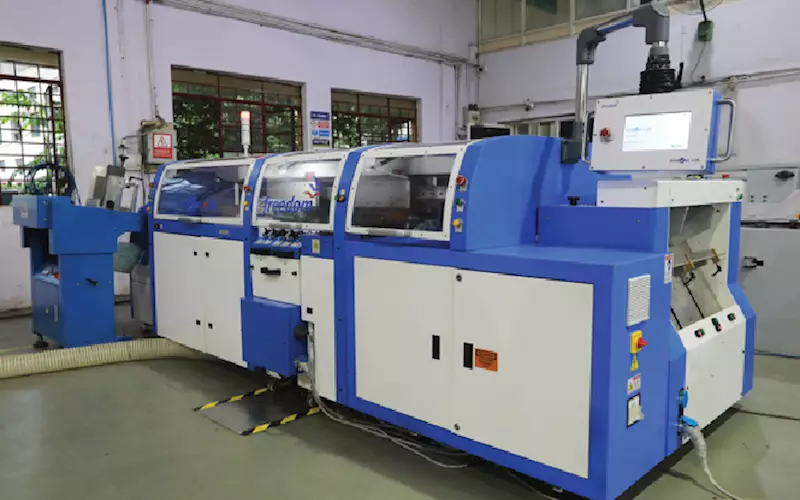
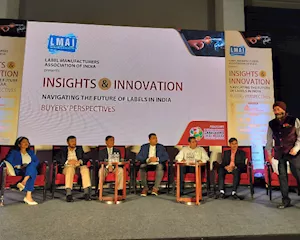
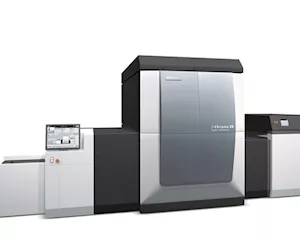
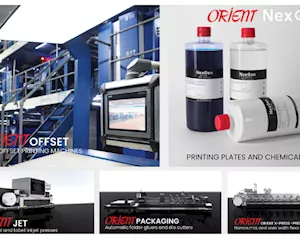
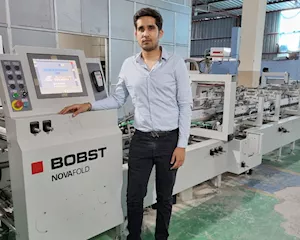
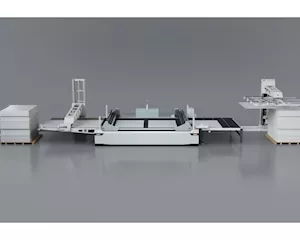






 See All
See All